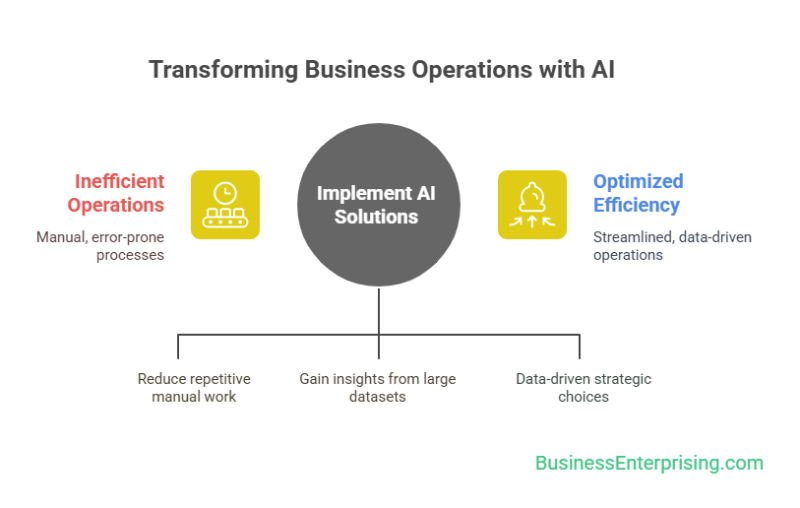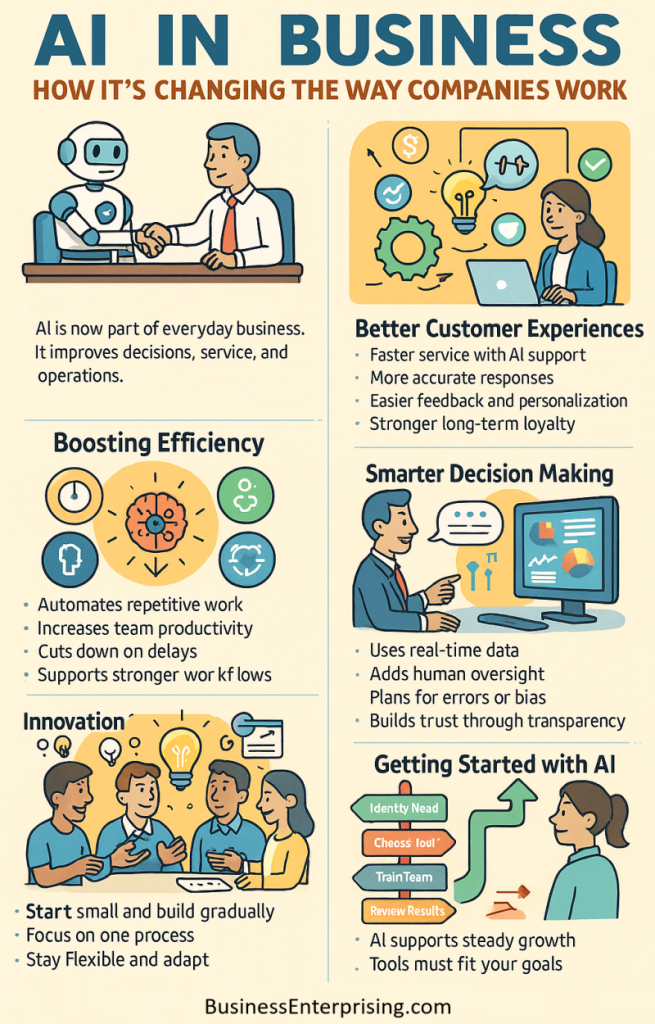 AI in business is no longer a trend. It’s becoming part of how companies work, make decisions, and serve customers. You’ve likely seen tools that sort data, write emails, or answer questions instantly. However, the value goes far beyond simple tasks.
AI in business is no longer a trend. It’s becoming part of how companies work, make decisions, and serve customers. You’ve likely seen tools that sort data, write emails, or answer questions instantly. However, the value goes far beyond simple tasks.
Additionally, more companies are using AI to improve speed and reduce errors. It can help you analyze patterns and forecast results. Therefore, you can spend less time guessing and more time acting on real data. This shift allows teams to focus on what matters most.
Moreover, AI supports better service by handling routine tasks. You may find that it helps your team stay more productive. When used right, AI can improve efficiency without replacing human input. It becomes a tool, not a threat.
However, using AI requires clear thinking and careful planning. You should look at what you need before choosing a system. Additionally, training your team is just as important as picking the right software. The goal is to build support around the technology.
If you’ve been unsure where to start, you’re not alone. Many businesses begin with one task and build from there. Therefore, take a measured approach and learn as you go. With each step, you can create real value and long-term improvement.
AI in Business: An Overview
AI in business has become a practical tool for improving efficiency, reducing errors, and driving smarter decisions. You may already use it without realizing it. From chatbots to automation, AI is helping companies handle tasks faster and with fewer mistakes.
Additionally, AI tools can analyze large sets of data in seconds. This gives you quicker insights and supports better choices. Therefore, many businesses use AI to study customer behavior or improve supply chain management. You don’t need a large team to start seeing results. With the right tools, small steps can lead to measurable gains.
However, AI doesn’t replace your team. It supports their work and removes repetitive tasks. Your staff can then focus on projects that require creativity or judgment. This shift often improves morale and productivity. Therefore, companies that adopt AI early often gain a competitive edge.
Moreover, AI can help you spot trends and adjust your strategy. You might notice patterns in sales or customer feedback that would take weeks to find manually. Additionally, AI-driven systems can support better forecasting and resource planning. These benefits make it easier to adapt to market changes quickly.
If you’re exploring new ways to grow or improve, consider the role of AI in business. Start with one process and see where it leads. Over time, you’ll discover how these tools can support your goals. The key is staying curious and open to change.
Enhancing Operational Efficiency
Improving how your business operates can make a major difference in costs, output, and employee satisfaction. Operational efficiency is not just about cutting time. It’s also about using time and resources better. Therefore, small improvements in routine processes can create long-term gains.
Additionally, clear systems help your team work with fewer delays or errors. You can spot slow points and fix them faster. However, efficiency doesn’t always require large investments. Many tools are affordable and easy to implement. The key is starting with one issue at a time.
Moreover, AI in business can play a supporting role. It can automate routine tasks and free up your team’s time. Therefore, your staff can focus on higher-value work instead of repetitive steps. You may also see fewer mistakes in areas like data entry or reporting.
As you review operations, look at how your teams communicate and follow up on tasks. Poor coordination often leads to wasted effort. Additionally, regular feedback from your staff can help you adjust your systems. They often know what slows things down.
If something takes longer than it should, there’s usually a better way to do it. Therefore, review your workflows often and keep an open mind. The goal is to create processes that save time without lowering quality. When your systems run smoothly, your business becomes easier to manage and more profitable.
Transforming Customer Experiences
Creating a better experience for your customers starts with understanding what they want. People expect fast responses and easy solutions. Therefore, your business must stay responsive and consistent. Every touchpoint should build trust and make things easier for your customers.
Additionally, small changes in service can make a big difference. Quick follow-ups, clear communication, and flexible options all help. However, you also need to track what matters to your audience. Gathering feedback can show you where to improve. Over time, those improvements lead to stronger customer loyalty.
Moreover, using AI in business can help you respond more effectively. Tools like chatbots and automated systems can handle simple tasks quickly. Therefore, your team can focus on solving complex issues and building relationships. You save time, and your customers feel heard.
If someone contacts you with a problem, how you respond matters. A fast reply often lowers frustration. Additionally, offering solutions without delay shows that your business takes service seriously. You don’t need big budgets to deliver better experiences. You just need the right tools and habits.
Consistent service builds customer trust over time. Therefore, make sure your team follows clear steps for handling requests. If you invest time in your service processes, you’ll often see more repeat customers. Better service doesn’t always mean doing more. It means doing what works, every time.
Data-Driven Decision Making
Making smart decisions requires more than guesswork. You need solid data to back up your choices and guide your actions. Therefore, many businesses are shifting to a more data-driven approach. This helps reduce errors and improves results over time.
Additionally, data shows you what’s working and what’s not. You can use it to track customer behavior, sales trends, or team performance. However, data only helps when you review it often and act on what you find. Regular analysis helps you stay on course and respond faster to change.
Moreover, AI in business is making data easier to understand. You can use tools that sort, compare, and present data in useful ways. Therefore, you no longer need to rely on guesswork or manual reports. These tools help you spot patterns and make smarter calls.
If you track the right metrics, you’ll start to see clearer options. You can test ideas and measure the results quickly. Additionally, better data can support your budgeting, staffing, and marketing choices. This keeps your business focused and reduces wasted effort.
Making better decisions starts with asking better questions. Therefore, build habits around reviewing key data each week or month. Use what you learn to guide your next steps. Over time, this habit leads to stronger performance and more predictable outcomes.
Driving Innovation and New Business Models
New ideas often separate growing businesses from those that stay stuck. You need space to test, adapt, and rethink how things work. Therefore, building a culture that supports innovation helps you stay competitive. It also gives your team a reason to stay engaged and invested.
Additionally, changing customer needs can drive fresh thinking. You may find that old methods no longer meet expectations. However, this shift creates new business opportunities. By listening closely and acting quickly, you can shape better offers and services. These changes may lead to entirely new revenue streams.
Moreover, AI in business is helping companies build new models faster. You can test pricing, delivery, and customer experience using real-time feedback. Therefore, innovation becomes less risky and more grounded in facts. AI also supports faster product development and smarter resource use.
If your current model feels outdated, don’t wait for a crisis. Start by reviewing what your customers need now. Additionally, look at what other industries are doing differently. Borrowing ideas and tweaking them for your business can lead to strong results. Keep testing and learning.
Small changes can lead to bigger shifts over time. Therefore, allow your team to pitch new ideas and try simple pilots. Some ideas won’t work, but others may surprise you. Over time, this creates a system for innovation that feeds long-term growth.
Addressing Challenges and Ethical Considerations
As you explore new tools, it’s important to think beyond speed and savings. New technology often brings new concerns and responsibilities. Therefore, you need to review how your tools affect both your team and your customers. Every business decision has an impact, and not all of them are positive.
Additionally, AI in business has raised questions around fairness, data use, and accountability. These concerns are not just technical. They also reflect how people feel about trust and privacy. However, that doesn’t mean you should avoid using AI. It means you should set clear rules and monitor how the tools are used.
Moreover, not every challenge is obvious at first. You may not spot bias in your data until it causes a problem. Therefore, regular audits and human oversight remain important. You should also be clear with your team and customers about how data is collected and applied.
If your business uses automation or decision tools, think through how mistakes will be handled. Additionally, consider who gets affected when a system fails. Having a backup plan or manual review process can protect your business and maintain trust.
No system runs perfectly on its own. Therefore, use AI to support people, not replace them entirely. Technology should help your team do better work, not feel less valuable. With the right balance, you can build trust and avoid avoidable risks.
Conclusion
Adopting new technology always comes with questions. However, those who take the time to learn often gain the most from it. You don’t need to overhaul everything at once. Instead, start small and focus on where improvements matter most.
Additionally, you should treat new tools as part of a larger strategy. Technology alone won’t fix weak systems or unclear goals. Therefore, think about how each tool fits into your current operations. When used correctly, even basic changes can lead to real progress.
Moreover, AI in business offers more than just automation. It supports smarter planning, better service, and faster decision-making. Therefore, businesses that stay open to new ideas often grow more efficiently. You may not see results overnight, but the long-term benefits can be substantial.
If you’re unsure where to begin, look at your most time-consuming tasks. Additionally, ask your team where they see bottlenecks or errors. You’ll often find small changes that bring measurable gains. Keep reviewing and refining what works.
You don’t need perfect systems to move forward. What matters most is starting with a clear plan and staying flexible. Therefore, focus on steady progress rather than quick wins. With the right mindset, your business can grow stronger and more adaptive over time.


